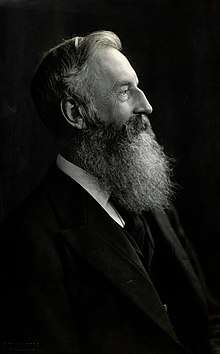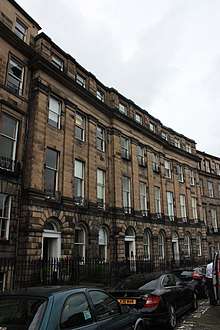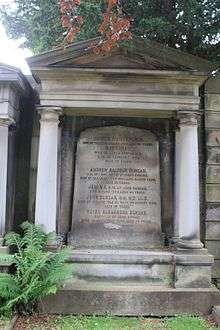John Duncan (surgeon)
Dr John Duncan FRSE LLD (1839-1899) was a Scottish surgeon who served as President of the Royal College of Surgeons of Edinburgh 1889 to 1891. On his father's death in 1866 he took over as director of the major drug manufacturer Duncan Flockhart & Co.

Life


He was born on 18 August 1839 the son of Dr James Duncan then residing at 7 Dundas Street.[1] He studied at the High School in Edinburgh then studied medicine at the University of Edinburgh. He graduated MA and received his MD [2]in 1862. Part of his early training was under James Syme.[3]
In 1866 he inherited his father's house at 12 Heriot Row.[4] In 1870 he was elected a Fellow of the Royal Society of Edinburgh, his proposer being John Hutton Balfour. From 1875 he was assistant surgeon at the Edinburgh Royal Infirmary being promoted to Senior Surgeon in 1887.[5] He also served on the Board of Managers for the Infirmary.[6] In 1890 Dr Henry Alexis Thomson worked with him as his assistant.[7] He retired as a surgeon in 1895, that being the usual practice at the time.
His Edinburgh home was 8 Ainslie Place[8] on the exclusive Moray Estate in western Edinburgh.
He died at Kinloch on the Isle of Skye on 24 August 1899, a few days after his 60th birthday. He is buried with his parents and wife on "Lord's Row" on the western wall of Dean Cemetery.
Family
His wife Jemima (1841-1885) died aged 44. His children were James Duncan (1867-1942), Eliza Alexandra Duncan (1868-1943), Margaret Duncan (1870-1941), Mary Elizabeth Morrison Duncan (1872-?), Ethel Graham Weir Duncan (1877-1947).
He was the uncle to William James Stuart (1874-1859).
Publications
- Angioma and Other Papers
References
- Edinburgh and Leith Post Office Directory 1839-40
- Duncan, John (1862). "Paraplegia". Cite journal requires
|journal=(help) - History of Scottish Medicine- vol 2, p.677
- Edinburgh and Leith Post Office Directory 1866-67
- Biographical Index of Former Fellows of the Royal Society of Edinburgh 1783–2002 (PDF). The Royal Society of Edinburgh. July 2006. ISBN 0 902 198 84 X.
- "Archived copy" (PDF). Archived from the original (PDF) on 4 March 2016. Retrieved 9 December 2015.CS1 maint: archived copy as title (link)
- http://livesonline.rcseng.ac.uk/biogs/E003266b.htm
- Edinburgh and Leith Post Office Directory 1898-99